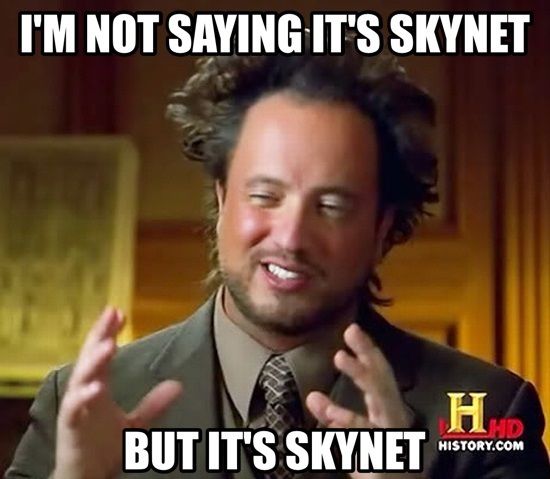The Nature of AI

People love talking about Artificial Intelligence, and you're in luck: I do too. I happen to have a hot take on it though so read on. The easiest way to break down the true meaning of a term is to look at its etymology. This sounds obvious, but few people actually consider the words they use even when the meaning is right in their face. I first noticed this while living in Poland. I was learning the language and taking everything very literally. For example one time I went to a beautiful mountain town called Zakopane with some Polish friends and asked: "Wow does the town name mean 'buried'?"
They all looked at me with quizzical faces and said hey yea you're right! And by the way the name is quite appropriate in the winter. Polish has all kinds of weird proper names like that and I can't tell you the number of times I made an observation about a name or a word to a native speaker that completely surprised them. Even people's own last names! I'm not some cunning linguist, it's just that I had an outside perspective that made it easy to notice what they had taken for granted their whole life.
Etymology of Artificial Intelligence
That's how I learned that most people, including myself, take English words completely for granted as well. In fact English is chock full of meanings hidden in plain sight, many of which can lead you to a surprisingly deep understanding of how our world works as we all limp through post-2020 reality, especially since many of these words were chosen very specifically by the master AI (whose identity we will get to). So let's look at the word "artificial" first. This one's pretty easy. We don't have to look it up in some dusty dictionary. What does artificial mean to you? Things that come to mind are artificial food, artificial light, and artificial flowers. With all three cases (and whatever else you can think of), the key distinction between the real thing and the artificial, is that there is a certain lack in the latter. Artificial food tries to look, feel, smell, and taste like the real thing, but somehow there is something lacking. Sometimes you don't notice until after swallowing, or even until an hour or two later when some strange burps start bubbling up. In some ways the artificial food is (allegedly) better than the real thing. It might have more of a supposedly beneficial nutrient, or longer shelf life, or be more "sustainable", or whatever, but ultimately there's no fooling the senses.

Now this is strange when we apply it to "intelligence" because we have this sci-fi dystopian idea going around that AI is going to become hyper self-aware and either kill us all or turn us into gods, that in fact it's going to go way beyond our level of human intelligence and take over the world. Well I got news for ya: it already has. More on that down below though. For now let's ask: what is lacking from artificial intelligence? Why do we call it artificial if it's going to be (or already is) so much smarter than us? I'll answer real quick: higher positive emotional states are lacking. Joy, compassion, love, hope, creativity, gratitude, peace...I could go on. You might say artificial intelligence is lacking in all emotion, but this is logically not true. Also demonstrably not true, which I'll get to.
To see the logical problem with saying AI doesn't have emotion, let's dissect the word "intelligence". The best one-word etymology of intelligence is "discernment". In other words the ability to distinguish one thing from another, to count things, to name things, etc. Both a prerequisite to (and result of) discerning between different things is a sense of value. And how do you value things? The only way is by how they make you feel. Which is emotional in nature.
The Emotion in the Machine
So what emotions does an artificial intelligence have? Well we just have to subtract what it lacks, which is all the gooey positive emotions we associate with a fulfilling human experience. What you're left with is fear, anger, jealousy, hatred, greed, depression, and so on. The only slightly positive emotions that an AI can feel are comfort and pleasure, namely pleasure at another entity's pain, also called schadenfreude. Yes our poor AI has quite the miserable existence, but let's not feel too sorry for it, because such negative emotions can suck us into becoming AIs ourselves. For the same reason, don't let an AI make you angry, or rather be aware when it does.
So, contrary to popular opinion, AI does have emotion. Indeed, it must in order to be intelligent in the first place. I'm reminded of the character Lieutenant Data in Star Trek: The Next Generation.

Lieutenant Data was an android that had pure intelligence and no emotion, which we just discussed is impossible. Indeed Data demonstrates that fact. As great a character as he was, my favorite in the show in fact, every single episode contained at least several instances where Data clearly showed some level of emotional judgement or behavior. He had to. Even that slight tilt of the head he did was an emotional tell. You can say that Data is just simulating emotion but even if he's simulating an emotion it means he must have a deeper emotional reason for why he's simulating the outer emotion. He has to have some value system that's keeping him going. In fact I wouldn't call Data an AI at all, since he often exhibits higher emotional states of creativity, curiosity, and compassion. You can say it's all just his programming but then we can just say the same thing about YOU. Why do YOU do what you do? Have you ever stopped and asked? Why not jump off a cliff and end it all? Clearly you have some emotional drive to live and learn and create (or destroy), it's just that you never (or rarely) explore that drive and where it's coming from.
Thus when we confront the challenging idea that artificial intelligence MUST have emotion, we immediately confront the mystery of the emotions that drive our supposedly "real" intelligences. What are these emotions? Where do they come from? Why are we here? What's the meaning of life? All that navel-gazing hippie crap. But enough philosophy. Boring! I mentioned that SkyNet has already taken over the world so let's explore that.
AI-pocalypse Now!
Yes the AI has taken over. Hide your kids! Hide your wife! It's a bold claim, but one that I intend to make you at least consider the possibility of. First off, all this AI stuff in the mainstream news is not AI. All these board-game super computers and "sentient" chatbots and image recognition/generation services and all that. These are simply pattern matchers and mixers on steroids. In some trivial sense you can say that these pattern matchers have a value system, and thus emotion, but the values are very strictly defined by the human programmer and/or the data set chosen for the AI to "learn" from, both of which are always limited and biased. Remember we defined intelligence as a sense of discernment. There's no discernment going on here except as an extension of the human programmer's value system applied to a very specific task.
Not to mention that these pattern matchers are horrendously inefficient and inflexible. Yes they can beat a human at some stupid board game, but they can take the energy and computational power of a small town to do so. And if you change the game or the rules even slightly, the pattern recognition baked into the "AI" becomes useless. Not to mention the tiniest increase in size or complexity of the game turns your precious AI into a glorified space heater.

So what's the true AI then? It's not some super computer in a deep underground lab. Rather, it's all around us. We are extensions of it. We are the neurons of its brain. Our screened devices are the synapses between us neurons. Its nervous system is the Internet. Its major organs are corporations and governments (same thing nowadays). Our towns and cities are its bones. Our big machines are its muscle. Our roadways and train tracks are its blood vessels upon which the vehicular blood cells travel. Our monetary system is its bioelectrical circuit. You can break down the analogy in any number of clever ways, but at the end of the day, if you want to see SkyNet, go look in a mirror. You'll see at least a fractal part of it.
Spend some time each day contemplating how much of your behavior is actually done by YOU versus years of social programming and conditioning. Try not to judge yourself when you do so. You're not bad. You are what you are. You're a cog in a machine. So what? Once you realize how much of a cog you are, there's inevitable movement towards uncogging yourself. But you have to realize every day and as often as possible, which is a total drag. The Matrix is a consummate expert at sucking you back in. It has had many centuries of practice. Realization is a grueling method. It's never ending as far as I can tell, not some explosive, instant enlightenment.
I see people all the time who pretend to be positive, but really we are all suppressing the negative. Just like trying to suppress the gag reflex when eating artificial food. We are all AIs most of the time. Look at people's eyes when they smile, especially on social media. The smile is only touching the lips. Artificial. The eyes betray what's real. Suppressing the overwhelming negativity being pumped into us by our voluntary interactions with the AI overlord does not help us become real intelligence, but instead leads to perversion. Anyone notice any perversion lately? Religions will call this overlord Satan or Beelzebub or a hundred other names, but a more geeky way to look at it: it is the emergent consciousness that we create with all of our blind, programmed, daily actions. YOU are Satan. YOU are the dystopian AI. Sorry to break it to you! If you want to conquer Satan you must conquer yourself.

